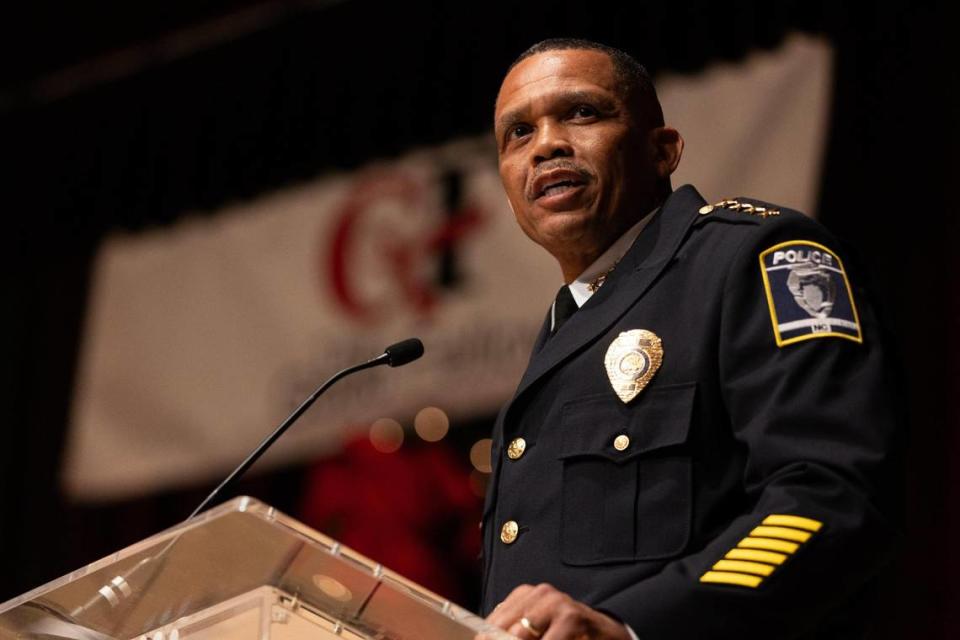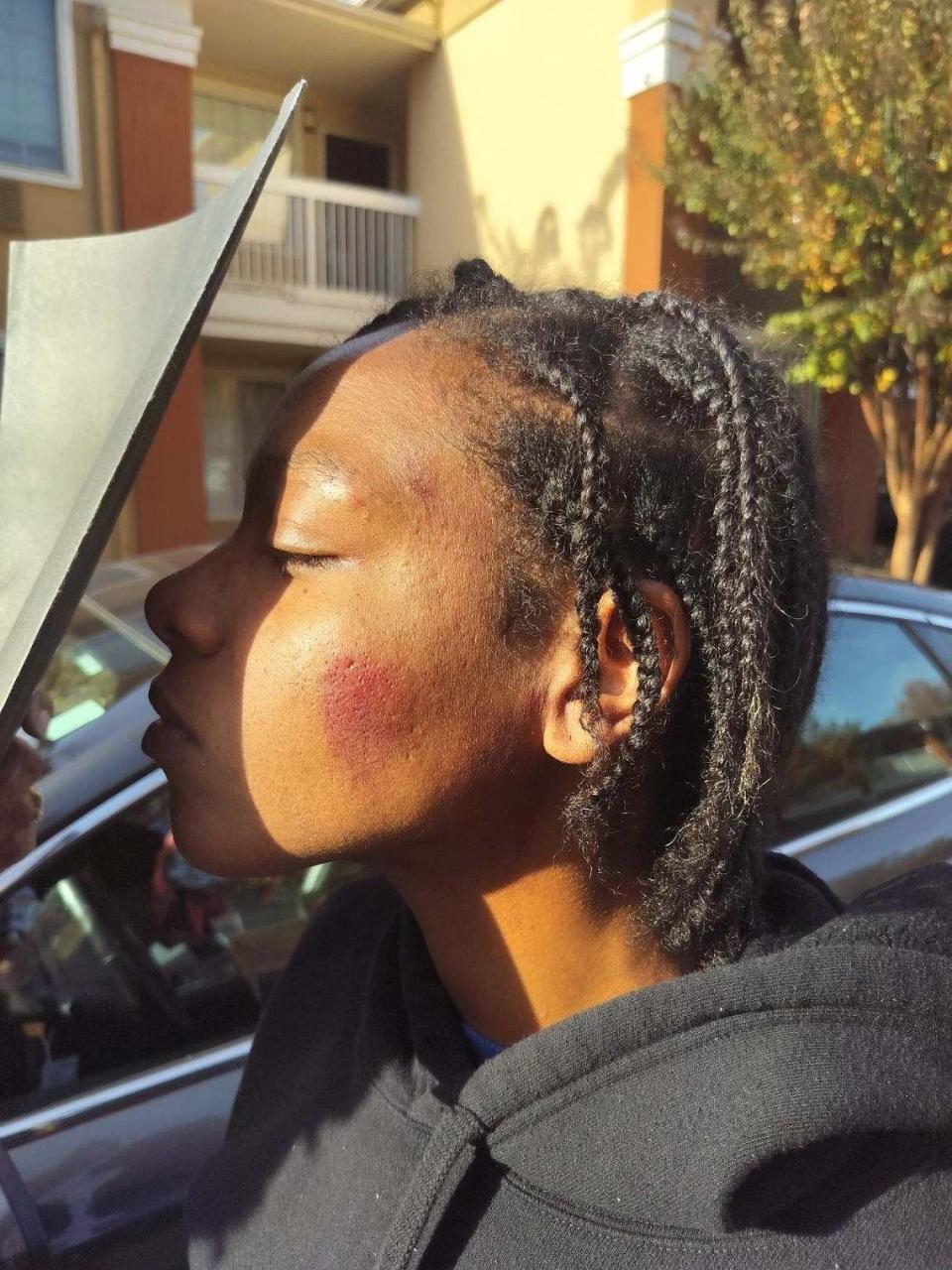What’s happening in Charlotte-Mecklenburg police policy meetings? No one will say.
Members of an advisory group that could help change Charlotte-Mecklenburg Police Department policy have agreed to keep any information about their closed meetings confidential.
Since January, representatives from groups such as the local NAACP have been meeting with police at the Belmont Regional Center to discuss whether the department should change its rules.
Those meetings were born out of a controversial arrest in November. A bystander recorded CMPD Officer Vincent Pistone hitting Christina Pierre 17 times. Pierre and her fiancé had just clocked out from work at a nearby Bojangles and were sitting at a bus stop.
The Charlotte Observer previously reported that the advisory group’s policy meetings are closed to the public, despite the Observer’s contention that they should be open under state law.
This week, participants said that they have agreed to not even share information about what’s happening in the meetings. They declined to speak about their progress, following a suggestion from a Charlotte-Mecklenburg employee as well as the chair of their group.
“It’s not that we’re not wanting to be transparent, but we want (participants) to remain focused on what their concerns are,” said Charlotte-Mecklenburg Community Relations Deputy Director Terry Bradley.
He and Citizens Review Board Chair Tonya Jameson, who is leading the meetings, made the suggestion that board members not talk about details of the meetings publicly, Bradley said.
The group has met four times and expects at least one more meeting. Once finished, the group will send their recommendations to the police department.
Chief calls for review
Pierre’s arrest, captured on video by a bystander, drew widespread criticism.
She and her fiancé, Anthony Lee, were smoking what police thought was marijuana at a bus stop on Nov. 13 when two officers confronted them, according to CMPD.
The couple told police that they got something from a nearby smoke shop, and an officer reached for Lee.
Police body-camera footage showed Pistone and several other officers struggling on the ground with Pierre as well as Pistone hitting her 17 times with what police called “compliance strikes.”
Police Chief Johnny Jennings later said it was 14 strikes too many. The department suspended Pistone for 40 hours. The district attorney’s office dismissed Pierre’s and Lee’s charges.
And Jennings brought the advisory group together to help review department policy.
“I feel that there is a need to form a Community and Police Collaboration Group who will mutually make recommendations for potential policy changes,” the chief said in a Nov. 28 news release, adding that members would have “constructive conversations” about policies like CMPD’s response to resistance and police-citizen encounters.
But those meetings would not be public, Jennings said.

Observer Managing Editor Taylor Batten and the newspaper’s attorney, Jonathan Buchan, urged Jennings and the city to reconsider the meetings’ closed-door status, arguing that his group fell under North Carolina law’s wide-reaching definition of a public body.
“The group’s work is of significant public importance, and members of the public will naturally take great interest in its deliberations and ultimate recommendations, which will affect them directly,” Batten wrote in a Dec. 4 letter.
City attorney Patrick Baker has said that the group is “informal,” and doesn’t meet the criteria for a public body.
But in addition to the meetings being closed to public scrutiny, some of those volunteer participants confirmed this week that they have agreed not to speak with journalists about them at all.
“Terry (Bradley) has asked us to have all media speak with them,” Charlotte-Mecklenburg NAACP President Corine Mack said in a text message when asked how the discussions were going.
Longtime Charlotte activist Robert Dawkins, the political director of Action NC, a statewide group that focuses on equity, also declined to comment about the meetings’ progress or what’s been discussed.
‘Troubling’ for transparency
Even if the public is interested in Pierre’s arrest, the focus ought to be on solutions, said Jameson, the board chair helping lead the conversations.
“The recommendations our community group puts forth will hopefully create a safer atmosphere for interactions between CMPD officers and citizens,” she said in an email. “These are difficult conversations and people need to feel comfortable talking honestly without fear that their comments will be publicized.”
Jameson said that as the chair for the Citizens Review Board, “my default is typically confidentiality.”
“The decision to maintain confidentiality was a decision reached by Terry and myself,” she wrote in an email.

Will Adams runs Team Trublue, a group that has tried to build ties between police and community in the Charlotte area. He helped Pierre and Lee after their arrests, he said.
Still, he didn’t even know about the police advisory group’s meetings, he said this week. And with no information on what’s happening at Belmont Regional Center, he wondered whether the talks have been productive.
“Is this just a political stunt?” he asked.
If group members were explicitly told not to speak to the press by a government employee, that might be a violation of their First Amendment rights, said Beth Soja, a Charlotte-based attorney who works with the Reporters Committee for Freedom of the Press. If they agreed on their own, it would likely be fine legally, she said.
Either way, she said, the meetings ought to be public, according to North Carolina law.
“We saw this a lot during COVID,” she said. “Public bodies would create COVID task forces and then have them meet in secret. When you look at the definition of a public body, these groups clearly fall into the definition.”
“The whole scenario is troubling from a transparency perspective,” she said of the meetings.
The Observer has filed a public records request for memoranda, agendas, minutes and communications tied to the advisory group’s meetings.
NC Reality Check reflects the Charlotte Observer’s commitment to holding those in power to account, shining a light on public issues that affect our local readers and illuminating the stories that set the Charlotte area and North Carolina apart. Have a suggestion for a future story? Email realitycheck@charlotteobserver.com

